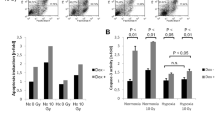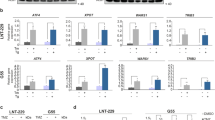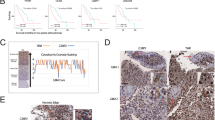Abstract
We have studied the role of the oxygen-dependent pyrimidine metabolism in the regulation of cell cycle progression under moderate hypoxia in human cell lines containing functional (T-47D) or non-functional (NHIK 3025, SAOS-2) retinoblastoma gene product (pRB). Under aerobic conditions, pRB exerts its growth-regulatory effects during early G1 phase of the cell cycle, when all pRB present has been assumed to be in the underphosphorylated form and bound in the nucleus. We demonstrate that pRB is dephosphorylated and re-bound in the nucleus in approximately 90% of T-47D cells located in S and G2 phases under moderately hypoxic conditions. Under these conditions, no T-47D cells entered S-phase, and no progression through S-phase was observed. Progression of cells through G2 and mitosis seems independent of their functional pRB status. The p21WAF1/CIP1 protein level was significantly reduced by moderate hypoxia in p53-deficient T-47D cells, whereas p16(INK4a) was not expressed in these cells, suggesting that the hypoxia-induced cell cycle arrest is independent of these cyclin-dependent kinase inhibitors. The addition of pyrimidine deoxynucleosides did not release T-47D cells, containing mainly underphosphorylated pRB, from the cell cycle arrest induced by moderate hypoxia. However, NHIK 3025 cells, in which pRB is abrogated by expression of the HPV18 E7 oncoprotein, and SAOS-2 cells, which lack pRB expression, continued cell cycle progression under moderate hypoxia provided that excess pyrimidine deoxynucleosides were present. NHIK 3025 cells express high levels of p16INK4a under both aerobic and moderately hypoxic conditions, suggesting that the inhibitory function of p16(INK4a) would not be manifested in such pRB-deficient cells. Thus, pRB, a key member of the cell cycle checkpoint network, seems to play a major role by inducing growth arrest under moderate hypoxia, and it gradually overrides hypoxia-induced suppression of pyrimidine metabolism in the regulation of progression through S-phase under such conditions.
This is a preview of subscription content, access via your institution
Access options
Subscribe to this journal
Receive 24 print issues and online access
$259.00 per year
only $10.79 per issue
Buy this article
- Purchase on SpringerLink
- Instant access to full article PDF
Prices may be subject to local taxes which are calculated during checkout
Similar content being viewed by others
Author information
Authors and Affiliations
Rights and permissions
About this article
Cite this article
Åmellem, Ø., Sandvik, J., Stokke, T. et al. The retinoblastoma protein-associated cell cycle arrest in S-phase under moderate hypoxia is disrupted in cells expressing HPV18 E7 oncoprotein. Br J Cancer 77, 862–872 (1998). https://doi.org/10.1038/bjc.1998.143
Issue Date:
DOI: https://doi.org/10.1038/bjc.1998.143
This article is cited by
-
A hypoxia risk signature for the tumor immune microenvironment evaluation and prognosis prediction in acute myeloid leukemia
Scientific Reports (2021)
-
Small interfering RNA expression vector targeting hypoxia-inducible factor 1 alpha inhibits tumor growth in hepatobiliary and pancreatic cancers
Cancer Gene Therapy (2006)



